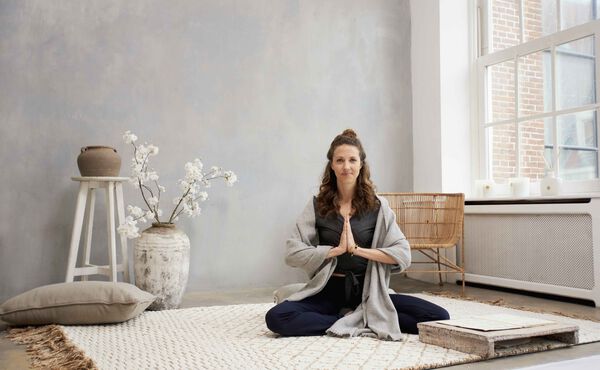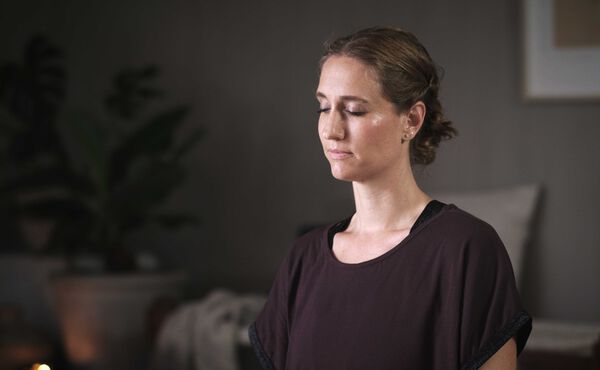Stress is an inevitable part of life. Although you can’t always avoid stress, it is possible to emotionally armour yourself against it. Clinical psychologist Erin Olivo, who specialises in mindfulness-based cognitive therapy, explains how.
We’ve all felt it before: that sudden sense of alarm that speeds up your breathing, makes your heart beat faster and tenses your muscles. Stress prepares the body for flight or fight. It’s a remnant of our evolutionary past that can still help us deal with some of life’s challenges. But when stress lasts for a longer period of time or when normal stresses start piling up to the point that they overtake you, it can seriously mess with your physical and emotional well-being.
.jpg?sw=285&sh=370&sm=fit&cx=0&cy=0&cw=285&ch=370&sfrm=jpg)
Between overscheduled workdays, demanding relationships and social media feeds that need fresh material, it’s easy for chronic stress to creep into our lives in today’s era. Dr. Erin Olivo sees the debilitating effects of stress in her private practice in Manhattan on a daily basis. To help her patients handle stress better, she teaches them mind-body strategies that involve meditation practices to strengthen the ‘mindfulness muscle’. It takes some practice, dr. Olivo says, but we can all learn how to do it. Here’s what she can tell us about unhealthy stress, how to recognise it, and how to combat it.
Stress has been linked to everything from depression to heart disease. Just hearing the word makes many of us tense up. Does stress deserve its bad rap, or is it not always harmful?
“Stress is really just your body responding to things that are challenging. You can experience tense muscles, a racing heart, a hard time catching your breath. Those bodily responses to stressors, which we call fight or flight responses, are not necessarily bad. But over time, stress can lead to high blood pressure, stomach problems, chronic muscle pain, fatigue, insomnia, tension in your body. That’s chronic stress. Chronic stress brings people to the doctor. Research has shown that one-third of all visits to the general practitioner are for stress-related symptoms. When we are having those symptoms, it’s a clue that we need to be handling our emotional stress better.”
What can we do to pick up on those clues and become better at handling stress?
“First of all, by really understanding what we’re feeling when we’re stressed. That’s where mindfulness is helpful. Mindfulness helps us do more than just react to stress. It’s about really figuring out what we’re feeling, about being more mindful of our stress. Being mindful of your stress means you separate yourself from it, so that your thoughts and feelings become objects that you can observe. That’s hard, because sometimes you can be so stuck in what you’re feeling that it’s difficult to take an observer stance. But it is something you can train, it’s a skill that can be learned. I teach my patients how to do mindfulness meditation to build their mindfulness muscle.”
How exactly does that work, building the mindfulness muscle?
“Stress happens in the body, so that’s the first thing you address. You start with your body, with your breath. When you become focused on where your breath is, where you physically feel it, your mind is going to wander onto something else. When your mind starts to wander, you pull yourself back to the breath. By doing that, you’re strengthening the muscle of attention. It’s not a failure of the meditation when you start to wander. It’s the bringing it back that is the practice.”
Can anyone do it?
“Absolutely. When people think of meditation, they often have this image of someone sitting cross-legged on a cushion. That’s definitely a legitimate way to practice meditation, but it doesn’t have to be that. You can practice it anywhere, even if it’s just for five minutes or five breaths. If you want to give it a try, I suggest you do something you’re going to do anyway - like brushing your teeth or taking a shower - and designate it as a mindfulness exercise. Whenever you find your mind wandering, pull your mind back to just that sensation of being in the shower. That’s an informal meditation practice, which is a good way to get started. If you want to do a formal meditation, just start with five minutes. It can be difficult to do long meditations, but it gets easier and easier.”
Are there any common causes of stress that you often see in your clinical practice?
“I think some of the main sources of stress is that we’re living in a turned-on world, which puts a lot of pressure on us to always be connected and available. Our workdays well extend the usual nine-to-five. On top of that, social media has turned us into the public relations manager of our own life. That’s stressful. People need time to slow down and just do nothing. Other common stressors are the old-fashioned ones of having relationships with other people. Adding a partner, a friend or a child to your life complicates things. People often have difficulty navigating that, which can make them feel stressed out.”
As a trained stress expert, do you ever feel stressed out yourself?
“Oh, sure! When I’m running for the train and I’m going to miss it, I feel stressed. But once I get on the train, I do some breathing exercises and bring myself back to a relaxed state. Stress is human, it’s part of life. It’s important to realise that the goal isn’t to never feel stressed again. The goal is to really feel our stress, to identify it, and to then do something about it.”
Lastly, do you have a daily routine?
“Before I begin my day of seeing patients, I do a brief ten-minute meditation exercise. I use the time to get myself grounded and present before I begin my day.”




